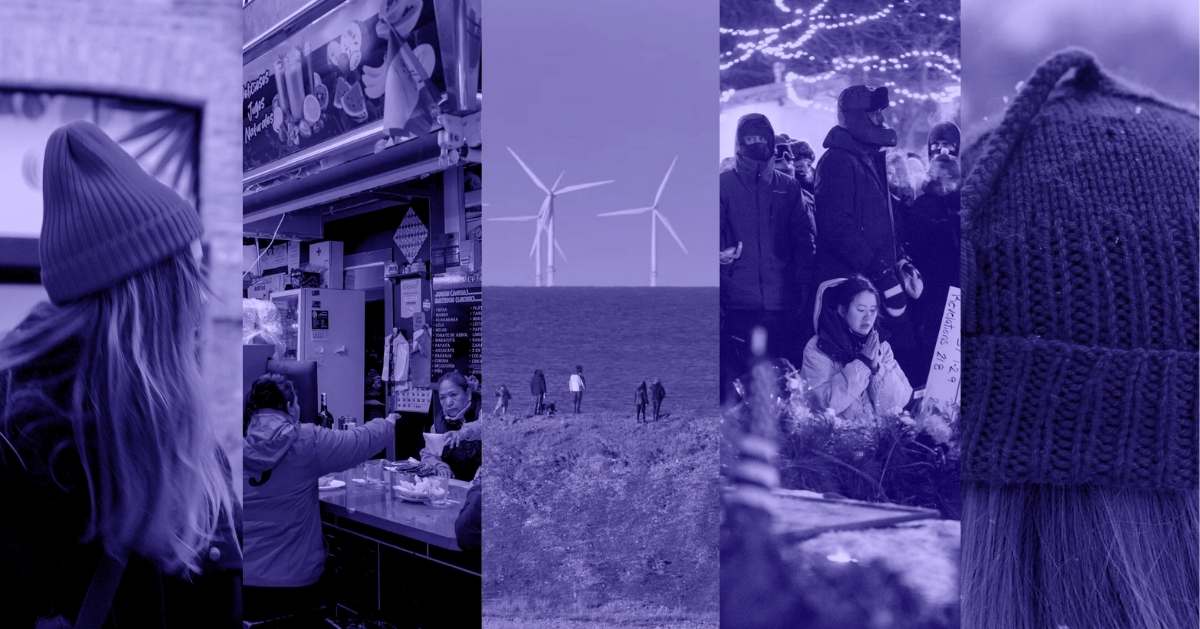Every day the Good Good Good team collects the best good news in the world and shares it with our community. Here are the highlights for this week!
If you want to get good news in your inbox every day, join the Goodnewsletter — the free daily newsletter designed to leave you feeling hopeful.
The Best Positive News We’re Celebrating This Week —
Cutting traffic and emissions, the first 11 miles of Hawaii’s new passenger train service just opened
Just over half of the “largest public works project in Hawaii’s history,” according to Honolulu’s mayor, is now open for passengers. The Skyline train is also the first passenger train service on Oahu since the 1940s, and it’s expected to service about 84,000 passengers daily.
Voters first approved building the train project 15 years ago, and once complete, it will stretch 20 miles from downtown Honolulu to communities outside of the city. Passengers have already reported the train’s ease of use, how quickly they get across town, and taking in the scenic views along the way.
It’s also expected to help reduce both the city’s persistent traffic jams and greenhouse gas emissions. Hawaii is working to reach carbon neutral by 2045, and ground transportation accounts for 20% of total state emissions.
What’s the nuance? Projects like these often take a long time to come to fruition — this rail project is taking longer and costing more than originally anticipated. And while personal electric vehicles can use existing infrastructure, that option isn’t accessible to everyone and doesn’t do anything to address traffic congestion.
Public transportation and other car-free alternatives are an important part of how we build our communities to serve everyone in them.
Deforestation in Colombia fell by 29% in 2022 over the previous year
Reaching the lowest level since 2013, deforestation in Colombia fell by 29.1% in 2022, thanks in large part to decreases in the Amazon region of the country. It’s also thanks to the government’s work with local communities, compensating them for protecting forests, and cracking down on illegal deforestation.
Down from 1,741 square kilometers in 2021, deforestation dropped by just over 500 square kilometers (193 square miles) to around 1,235 square kilometers in 2022. That also far surpassed the country’s goal of cutting the rate of deforestation to 1,400 square kilometers annually by 2026.
The country’s president has also called on wealthier nations to cancel the foreign debt of countries like Colombia in exchange for their work to protect and conserve ecologically critical areas like the Amazon — which are essential to combatting climate change.
Sweden is building the world’s largest wooden city, which will produce significantly less carbon emissions
The construction industry is responsible for nearly 40% of global emissions. Meanwhile, studies have found that building with wood (instead of steel and concrete) can reduce emissions by up to 26.5% when accounting for manufacturing, transporting, and installing the materials.
Sweden is about to embrace that low-emission benefit on a massive scale. Developers are gearing up to build the “world’s largest urban construction project in wood” in Stockholm. Once complete, “Stockholm Wood City” will have 7,000 office spaces, 2,000 homes, restaurants, and shops.
And it will join similar lower-polluting, timber-construction projects in Singapore and Norway, and potentially others to come.
What’s the nuance? This construction approach does come with one large risk: fire safety. However, experts land on both sides of that issue: some say any higher risk cited is just misinformation, while others express concerns over fire safety regulation issues.
Still, in an effort to reach net-zero global carbon emissions, construction will need even more creative, innovative solutions like this.
→ Read more
BlocPower is electrifying America one building at a time — getting them off of fossil fuels for good
No matter how hard you work to get outside, the reality is we spend a lot of time indoors — and buildings account for 30% of America’s total emissions.
With the belief that there is no true way forward in responding to the climate crisis without getting all of the existing buildings in America unplugged from fossil fuels, Donnel Baird founded BlocPower, a company dedicated to “greening” buildings across the country.
So far, the company has greened more than 1,200 buildings in 25 cities across the U.S. by replacing unhealthy fossil-fueled heating and cooling units with sustainable electric systems — especially those in low-income communities.
Why is this good news? Not only critical to addressing the climate crisis, but electrifying buildings is also good for our health. Recent studies show that gas heating systems in many homes and buildings leak chemicals like benzene, methane, and nitrogen dioxide — which are toxic and can lead to grave health complications that can be worse than breathing in secondhand cigarette smoke.
Chef José Andrés just became the first chef in the U.S. to put ‘no-kill’ chicken on the menu
Making history in the U.S., humanitarian and Chef José Andrés is now officially the first chef in the country to put cell-cultivated, “no-kill” chicken on his restaurant’s menu and serve it to customers.
Earlier this month, Andrés hosted a dinner at his Peruvian restaurant China Chilcano in Washington, D.C. where he served charcoal-grilled chicken to his guests. The dish will officially be on the menu and available to customers at the end of July.
The cell-cultivated meat created by Eat Just Inc. is the world’s first-to-market meat grown from animal cells instead of slaughtered livestock. It was just approved by the USDA in America.
Why is this good news? With the exception of a handful of cases where regenerative practices are implemented, the agriculture and animal-raising industry is notoriously harmful — to both the planet and the animals involved.
For a world-renowned chef to throw his name and support behind a product that meets an essential need for humanity (food) and doesn’t cause harm to the planet or animals is really good progress in our food production systems.
Amidst strikes, Abigail Disney and fan activists are uniting to protect and support Disney employees
With the WGA and SAG-AFTRA strikes underway, you may be inclined to think super fans are impatiently waiting out delays in production for their favorite films and shows — but you'd be oh, so wrong. They’re actually part of the resistance.
Fandom Forward, a nonprofit dedicated to using popular media as a gateway to activism); Imperative 21, an organization that calls for a systemic reset of America’s economic system; and Abigail Disney a filmmaker, philanthropist, and activist, have just teamed up to launch a new campaign dedicated to protecting Disney employees.
The Be A Hero campaign's ask is simple: implore Disney’s shareholders to vote to expand its “duty of care” legal obligations (a company’s legal responsibility to maintain the health, safety, and well-being of others) to include its workers — not just its shareholders.
Why is this good news? Not extending the duty of care obligations to workers (“cast members”) has led to the unlivable wages and poor working conditions that Disney employees have been protesting for years. By involving shareholders and involving all Disney fans (add your name to the petition!), this campaign can make real change for good.
A 13-year-old is using hydroponic gardens to fight food insecurity in New York City and Tel Aviv
In 2019, Steven Hoffen took a trip to Israel and worked with a nonprofit where Arab and Jewish women work closely together growing produce in hydroponic gardens — a type of soil-less gardening that can be done indoors or outdoors and is especially useful for those with little space.
Inspired by that multi-faith effort to provide food for communities in need, bring together people of different backgrounds, and provide economic opportunity to women — Hoffen created an award-winning film about it. Not only was it featured at over 100 festivals — it led to Hoffen starting his own nonprofit, Growing Peace.
Since launching, Growing Peace has already installed four hydroponic gardens between New York and Tel Aviv. The Growing Peace system in Tel Aviv, for example, feeds up to 600 families of asylum seekers twice a month with more than 2,100 servings of fresh food.
More good news of the week —
The cast of “Oppenheimer” left the movie’s premiere early in London in solidarity with the Hollywood writer’s strike. Florence Pugh, Matt Damon, Emily Blunt, and others left before the screening after SAG-AFTRA voted to join the screenwriters’ strike, which has been going on since May.
A painter uses intricate oil paintings to raise awareness and advocate for extinct and endangered species. Isabella Kirkland’s “Back” documents 48 species of flora and fauna brought back from the brink of extinction — or thought to be extinct and joyously rediscovered.
A federal judge upheld one of the toughest gun control laws in the country that was approved by voters in Oregon. The judge said banning large-capacity magazines and requiring a permit to purchase a gun is constitutional.
In an effort to cut down on waste and pollution, France is paying people to repair their clothes and shoes. Discounts will vary from $7 to $28 depending on complexity, and tailors, clothing brands, and repair shops can join the initiative for free.
The Biden administration just approved the construction of the country’s largest offshore wind farm. The 98-turbine Ocean Wind 1 project will be built about 15 miles off the coast of New Jersey and generate enough electricity to power 380,000 homes.
A group of immigrant moms in Denver made history as the first graduating class of parents between the ages of 30-40. The “community hubs” program through Denver Public Schools helped 28 single mothers get their GEDs.
The first RSV antibody treatment to protect all infants was just approved in the U.S. The treatment provides vaccine-like protection over the course of a single winter respiratory virus season and is the first time protection will be offered broadly to all healthy babies.
The Biden-Harris administration is investing $660 million to “plug” orphaned oil and gas wells throughout the country. Millions of Americans live within a mile of an orphaned oil and gas well, which pollute backyards, recreation areas, farmland, and public spaces — in addition to contributing to the climate crisis.
There have been over 200 sea turtle nests in Cape Hatteras so far this year — on pace with last year’s record. There were a record 379 nests in 2022, and 216 at this point in the summer, thanks to conservation efforts in the area.
Using recycled diapers, a new building technique is helping reduce landfill waste and lower housing costs. It’s particularly helpful in places like Indonesia, where population booms are putting a heavy strain on both housing demand and waste management.
Deserted after the pandemic, empty office buildings are being turned into vertical farms for food production. In 10 major cities, office usage rates are around 50% of pre-pandemic levels, and nearly 20% of office space is empty across the country.
A new carbon-negative cement just received third-party certification that it’s just as structurally and chemically the same as regular cement. Cement accounts for about a twelfth of global carbon dioxide emissions — it’s worse for the climate than flying.
The European Parliament agreed to historic, legally-binding targets to protect and restore nature across Europe. The first major legislation of its kind in the last 30 years will require countries to introduce measures to restore nature on a fifth of their land and sea by 2030.
A new 67-home neighborhood in Canada will be net-zero, off the grid, and leave room for nature to continue to grow. The neighborhood is designed to be walkable, the homes will produce more energy than they use, and they’ll be built on former farmland while helping protect and restore nearby forests and wetlands.
The EPA finalized a rule to move toward a 40% phasedown of the use of planet-warming hydrofluorocarbons. HFCs are used in refrigeration and air conditioning and can be hundreds or even thousands of times more potent than carbon dioxide.



